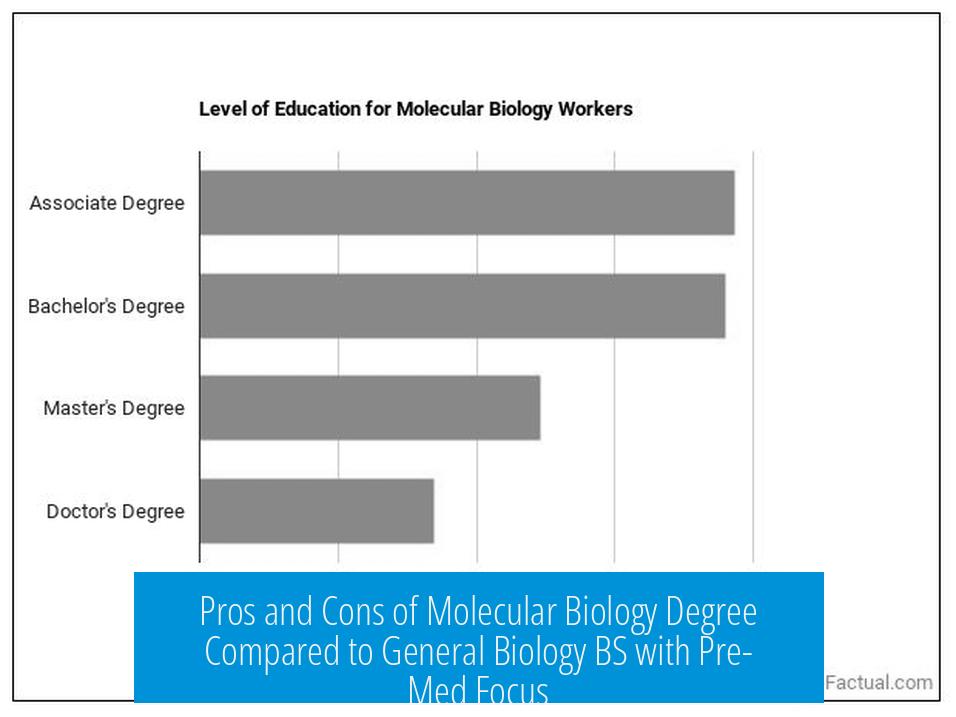Pros and Cons of a Molecular Biology Degree versus a General Biology BS with Pre-Med Concentration
Choosing between a Molecular Biology degree and a General Biology Bachelor of Science (BS) with a pre-med concentration depends largely on your career goals, academic interests, and desired educational experience. Both paths offer distinct advantages and challenges, especially when considering coursework, research experience, career flexibility, and medical school applications.
1. Coursework and Specialization
Molecular Biology Degree
This degree focuses on specialized, upper-level biology courses. It narrows academic options in later years but allows concentration on detailed, molecular-level biological processes. Students often take courses involving cloning, DNA analysis, and lab techniques directly related to molecular biology. These courses tend to provide substantial laboratory experience.
For example, some courses assign semester-long lab projects involving molecular cloning. This hands-on practice prepares students for real-world research settings, which many general biology programs may not emphasize. The focused coursework aligns well with students who prefer deep expertise in molecular mechanisms.
General Biology BS with Pre-Med Concentration
The curriculum is broader, offering a wide range of biology topics. Students can take diverse courses across ecology, physiology, and genetics, often paired with pre-med requirements like organic chemistry and anatomy. This breadth can appeal to students wanting a wide biological perspective or preparing for medical school.
In some regions, including Europe, there is little difference in job prospects between molecular biology and general biology degrees. Student advice often highlights personal interest and career goals as decisive factors rather than degree title.
2. Research and Laboratory Experience
Molecular Biology Degree Advantage
Specialized molecular biology programs usually provide meaningful laboratory experiences through coursework. Students frequently work in labs, learning techniques that are valuable for graduate research or industry employment.
For students without independent research roles, molecular biology labs offer critical hands-on training. Many students report that molecular biology lab classes better prepare them for actual laboratory work compared to general biology programs, where lab classes may be more basic and less practical.
General Biology Degree Disadvantage
General biology students may lack equally rigorous lab experience through mandatory courses. Some students find that their lab skills are less competitive, which can affect job opportunities after graduation, particularly in research-intensive roles.
In the U.S., many graduates with a general biology BS find that further graduate education is necessary for research or specialized careers. The lack of strong lab experience at the undergraduate level can pose challenges in entering such fields directly.
3. Career Flexibility and Job Prospects
Molecular Biology Degree
This degree can enhance applications for graduate school programs, especially in biomedical research fields. Its specialized training makes graduates competitive candidates for master’s or doctoral programs focused on molecular and cellular biology.
Employment in biotech, pharmaceuticals, or research institutes often favors candidates with extensive molecular biology skills. However, these advantages are more pronounced in some regions, such as the U.S., than others.
General Biology Degree
The general biology degree offers greater flexibility. Students often complement their major with courses outside science, increasing adaptability for various careers. The major itself does not typically limit job prospects significantly, especially for medical school applicants.
In some geographic areas, such as Europe, both degrees lead to similar career paths. The choice between molecular biology and general biology may not affect employment opportunities substantially in those contexts.
Both Degrees
- Both degrees can support careers in medicine, biomedical research, public health, and related fields.
- Additional education, such as graduate studies or professional degrees, often becomes necessary for advanced positions.
4. Impact on Medical School Applications
The choice between molecular biology and general biology does not majorly impact acceptance into medical schools. Medical programs prioritize completion of prerequisite courses, strong GPA, and extracurricular achievements.
A molecular biology major might slightly differentiate a candidate among pre-med students, but other factors like clinical experience and unique personal interests tend to matter more.
Interestingly, some advisors suggest that pursuing a non-science major with completion of medical school prerequisites might better distinguish an applicant. Majors in arts or humanities combined with required science courses can provide a unique profile for admission committees.
5. Personal Interest and Career Aspirations
Decisions should revolve around personal interests and future goals. Consider whether you enjoy detailed molecular studies or prefer a broader exploration of biological concepts.
Ask yourself:
- Are you attracted to molecular and cellular mechanisms?
- Do you prefer gaining a wide biological perspective?
- What careers do you envision?
Your motivation and enthusiasm will shape your success more than degree titles.
6. Additional Recommendations
Consulting your academic advisor is essential. Advisors can tailor advice based on program specifics and your aspirations. They also provide updated insights into job markets and educational pathways.
Ultimately, understanding your long-term goals clarifies the choice. A well-informed decision is better than merely weighing pros and cons without context.
7. Summary Table Comparing the Degrees
| Aspect | Molecular Biology Degree | General Biology BS with Pre-Med Concentration |
|---|---|---|
| Coursework | Specialized molecular courses; in-depth lab projects; fewer electives | Broad biological topics; includes pre-med prerequisites; more course variety |
| Lab Experience | Practical lab work; skills useful for research jobs and grad school | Basic lab classes; less emphasis on molecular techniques |
| Career Prospects | Better for graduate research; biotech and pharma jobs | More flexible; good foundation for medical school and health fields |
| Medical School Impact | Minor advantage; completion of prerequisites matters more | Equally valid; unique majors with prerequisites may stand out more |
| Suitability | Ideal for those focused on molecular science and research | Better for those seeking broader knowledge or direct medical career |
Key Takeaways
- Molecular Biology degrees offer specialized, practical lab courses useful for research and graduate studies.
- General Biology BS provides breadth and flexibility, pairing well with pre-med studies and various career paths.
- Research experience is more embedded in molecular biology programs, benefiting job readiness in lab roles.
- Medical school admissions focus more on prerequisite completion and unique applicant factors than on the specific biology major.
- Your personal interests and career goals should guide your degree choice.
- Consult academic advisors to tailor decisions to your situation.





Leave a Comment